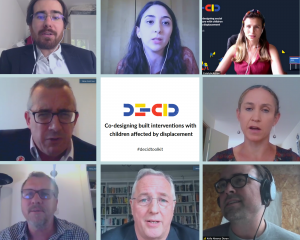The DeCID handbook is a practical toolkit for actors involved in co-designing with children affected by displacement. It stands for ‘Designing with children in displacement’, an abbreviation that plays on the word ‘decide’ – a right the handbook believes children and communities affected by displacement should be entitled to. Indeed at the core of its approach is the belief that children are agents and right holders who have the knowledge and expertise with which to shape their own lives. Based on this premise, the handbook sets out the importance of co-designing with children affected by displacement, the benefits it can have for displaced children and their communities, and the tools needed to make this happen. Its aim is to raise the number and quality of built interventions that are co-designed with children affected by displacement in the urban context, ultimately advancing their wellbeing and increasing democratic responses to global displacement.
The handbook is a partnership between the DPU, CatalyticAction, UN-Habitat and UNICEF and is a product of extensive research around the area of participatory design. In line with its inter-sectoral approach, the research, case studies and tools found in the handbook, are the cumulation of work conducted by academics, designers, humanitarian actors, municipalities, local communities and children! In addition to the main handbook, we’ve also produced a series of thematic briefs and short videos containing interviews we conducted with experts around the process of co-designing with children. Our research also engaged MSc students who led 8 dissertation projects on themes related to the handbook. While the focus of the DeCID handbook was to condense research at the intersection of child displacement, co-design and urban contexts into one handbook, throughout the project we found and built upon a number of excellent resources. Therefore, to complement the DeCID handbook, we’ve created an open-access online resource library to allow for further reading around areas of particular interest. These are all outputs of the DeCID project led by Principal Investigator Dr Andrea Rigon and funded by GCRF UKRI.
The DeCID handbook and interactive website were officially launched on the 2nd of December with an online event about co-designing with children affected by displacement. Speakers from DPU, UN-Habitat, UNICEF and CatalyticAction each presented their take on the importance of participatory design, the benefits it brings to displaced and host communities and their experiences of how it can and should be implemented. With attendees present from 27 different countries and translations in both Spanish and Arabic (the other languages of the handbook), it was the perfect way to introduce the handbook to a much wider global audience.
The key messages and ideas from DeCID can be summarised as follows.
- With protracted refugee situations now lasting an estimated average of 26 years and 60% of refugees living in urban areas, it is vital that social infrastructure including schools, playgrounds and public spaces are of good quality. For children specifically, high quality infrastructure can lead to healthier development and positive wellbeing.
- By using co-design methods to engage children in the creation of high quality social infrastructure, actors can ensure that it appropriately meets their needs. Indeed every child’s experience of displacement is different, defined by age, culture, gender, family structure amongst other factors that require tailored spatial interventions.
- Successful co-design interventions also rely on a collaboration between actors, each of whom can bring different and suitable expertise to a project. This means working with designers, engineers, construction workers but also educators, psychologists and caregivers who can bring their specific knowledge to a project.
- There are numerous benefits of taking a co-design approach. These include: improving social cohesion between displaced and host communities; boosting the local economy by providing work, training and a demand for locally sourced materials; an increased sense of ownership towards public spaces and sustainable infrastructure in the long-term.
The DeCID handbook provides a framework of tools, templates, guidelines and case studies that can be used as a base for different co-design initiatives. You can access the open-source handbook here: https://decid.co.uk/



